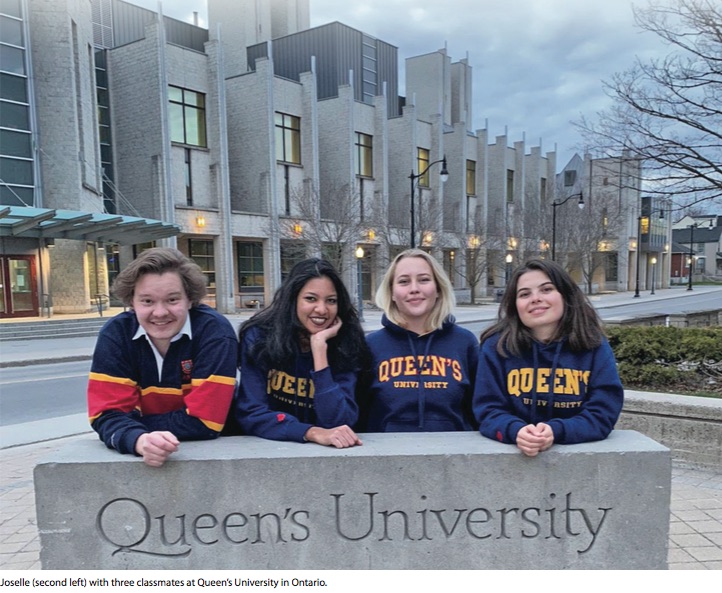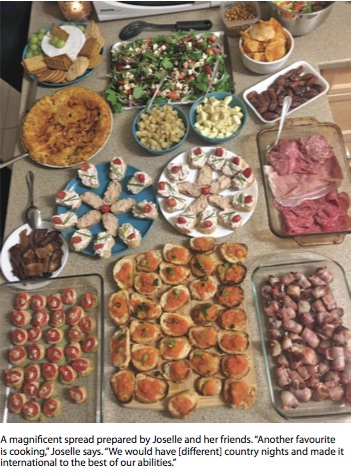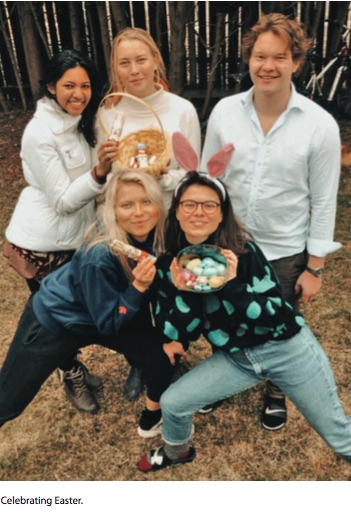For students, dealing with the disruption to school – and life – caused by COVID-19 has been difficult; imagine how difficult for those studying abroad.
When the world wokeup to the threat of the pandemic, 21-year-old Joselle Ali was taking part in The UWI Student Exchange programme, spending a semester at Queen’s University in Ontario, Canada. A Management Studies and International Relations student at UWI St Augustine, Joselle had made enthusiastic plans to take part in the exchange programme offered by the International Office. Yet, because of the coronavirus, her semester away turned out very differently. Different, however, does not mean bad, as she told UWI TODAY in an online interview.

I first travelled abroad last year; but this experience has been vastly different due to the absence of friends as a source of comfort and safety net. Regardless, it has been nothing short of amazing. This is my first time away from family and it’s a test of my abilities to be self-sufficient and independent. I had some fear but this was overshadowed by excitement which transformed it into one of the best experiences I have ever had.
My initial feelings were shock and panic, followed by a swift urgency to salvage as many experiences possible from the remainder of my exchange. A whirlwind of thoughts ensued such as, “what will happen to classes?’, “is my family okay?”, “will my visa expire before I can leave?” Throughout the myriad of thoughts and feelings, the most prominent was “I am not ready to go home”.
I was determined to remain as long as possible even in the face of a pandemic because this exchange is something I have wanted and spent most of my degree planning. The signup process wrought much frustration that lasted over the course of one year. Allowances had to be made for my being able to exchange in my final semester. As a result, this opportunity became much richer and more coveted. It was not something I was willing to relinquish so easily.
There was anger for a short while but part of my coping process was trying to look at the bigger picture - that I was not the only one affected. All the other students on exchange were in similar positions, or even worse off. In pausing and reevaluating, I realised that I was lucky. For instance, some students who went on exchange in Europe only got three weeks before having to return home. Truthfully, most of my coping had to do with my support system. My friends and I made a joint decision to remain and weather the storm together [instead] of returning home. Within the span of one week more than 75 per cent of the students returned home. My housemates moved out and classes shut down. It was a lot to process. However, knowing I had friends by my side was the most stabilising outcome I could envision.
The hardest part has been the adjustment away from socialising because, for me, this was a big part of the exchange. I was excited to go to class, explore the building and chat with other students. I joined a salsa club and had gotten accustomed to receiving impromptu invitations to clubbing, house dinners, and other events. I loved the exhilaration and freedom of being able to drop everything and simply go. There were no restrictions, time limits or safety concerns to be worried about and it was one of the best feelings I have ever had. The fact that it was all ripped away so suddenly was difficult.

This experience has no impact whatsoever on my willingness and desire to travel. In my opinion, studying abroad is one of the best programmes a university could offer.
Queen’s has been a huge help throughout this ordeal. When the news broke, our exchange co-ordinators immediately reached out to provide comfort and a support system during the transition. Virtual counselling sessions were also made available for students. Lecturers pushed back deadlines after a week of class suspension, in addition to being more lenient overall once circumstances were explained. Special consideration was given to those who had to immediately return home. However, the most gracious change made was giving all students the option to change grades to a pass or fail upon receiving transcripts, if the grades were not reflective of a student’s normal functioning capabilities. Students no longer had to worry excessively about academics due to the situation.
The city where the school is situated, thankfully, did not have very stringent restrictions compared to others in the province. Socialising was restricted but still occurred in the stipulated numbers. Additionally, living in a student community with virtually all students gone, Kingston very quickly became a ghost town. There was still minimal activity and my friends and I socialised only with each other, every day, since lockdown. We held dinners, movie nights, workout sessions, game nights and even celebrated Easter together. Otherwise, communication occurred through voice and video calls.
When there aren’t assignments, I have been doing what any student does once the semester is over: catching up on movies and shows. I have also been trying to reignite my love of reading. Prior to university, this was a norm. Another favourite is cooking! A big part of most days is the anticipation of which new foods we would try. We would have [different] country nights and made it international to the best of our abilities. Lastly, I just appreciated the silence and the freedom. It helped me understand how fortunate I was. Some may think that living alone is lonely but, to someone who has never had a place to myself, it was a new experience and I was grateful. I had the space to slow down, process, and think.

This experience has no impact whatsoever on my willingness and desire to travel. In my opinion, studying abroad is one of the best programmes a university could offer. If I were to convince other students to do the same, I would promote the opportunities for personal growth. You are exposed to so many persons with different cultures, backgrounds, perspectives, and opinions. The exchange places you in a real-time, interactive scenario where you can evaluate and develop your views away from your comfort zone. It is an enlightening and enriching learning opportunity.
You cannot predict what will happen or where you end up; and that’s the beauty of it. For example, I had plans to stay within Canada, focus on my studies and allow some exploration after exams. Instead, I made new connections and ended up booking a weeklong trip to Mexico a few days before the flight, after only one month and a half of being there. It turned out to be the best trip ever! I learnt that exchange students possess a different agenda from domestic and even international students. In our minds, it is an adventure that is multicultural and open but with an expiration date. This knowledge helps forge strong friendships and support systems quickly and the craziest ideas become your norm.
Don’t see the virus as an obstacle but as a new and challenging context that is surmountable. The experience is worth the risk; it makes it that much more valuable. If I had known that the virus was coming, I would still have gone on this exchange.
Work on turning pessimism into optimism and adversity into opportunity. Do this and the virus, or any phenomenon, will have less control over your time and thoughts.